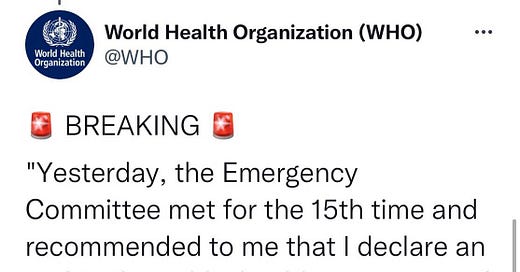Today the World Health Organization declared the end of the Public Health Emergency of International Concern (PHEIC). This is a huge moment in our story arc of the fight against COVID-19. Here is what it does and does not mean.
What this means
The WHO Emergency Committee believes three things:
COVID-19 is not unusual and unexpected.
Cross-border transmission can’t (and won’t) be stopped.
COVID-19 does not require a coordinated international response.
A PHEIC is a key legal mechanism within global health security. The hope is that it catalyzes timely action to limit the societal impacts of emerging risks. Since the PHEIC mechanism started in 2005, a PHEIC has ended five (out of seven) times. So this is a fairly new mechanism. But essentially the end of the PHEIC means:
The end of mobilizing international coordination;
The end of streamlining international funding;
The end of accelerating the advancement of the development of vaccines, therapeutics and diagnostics under emergency use authorization.
The WHO now sees COVID-19 as a threat in our regular repertoire of things-trying-to-kill-us. These things will still happen but with less urgency.
What it does not mean
This doesn’t mean the end of a pandemic. Declaring a PHEIC is not the same thing as declaring the end of a pandemic. “Pandemic” is rhetoric that governments use as a communication tool—it indicates the widespread occurrence of an infectious disease across the globe at a particular time. In theory, the end of a PHEIC comes far before the end of a pandemic.
This doesn’t mean that COVID-19 is gone. SARS-CoV-2 is currently mutating 2 times faster than the flu. We will get future waves, but hopefully these will be “wavelets” given the population-level immunity from vaccines and infections. And wavelets will happen several times a year. The probability of a variant of concern (which would be named Pi) is still ~20% in the next 1.5 years. If one emerges, it would likely cause a tsunami. (We saw something similar happen after the 1918 flu emergency ended.) And we cannot ignore the fact that COVID-19 is a leading cause of death in many countries. This will likely remain for years.
This doesn’t mean that we can go back to pre-pandemic times. This does not mean that some countries (cough, cough U.S.) don’t have serious underlying problems that need to be addressed. It’s beyond time to confront the threats to our individual and collective health so we are not in a constant state of emergency. We cannot keep living in a perpetual cycle of panic and neglect.
Bottom line
I welcome this decision to end the emergency for the same reasons I thought it was time to end the American national emergency. We now find ourselves in an awkward phase with this virus—somewhere between a full-blown emergency and an endemic state of predictability. (Epidemiologists don’t have a word for this phase.)
Use this time to take a deep breath, cry, reflect, hit a pillow, meditate and/or celebrate surviving (figurately and literally) the past 3.5 years. We deserve all the feelings today, especially for those of us on the front lines who sacrificed so much. Today is a monumental symbol of this life-changing event. But then we need to hold our heads high and continue fighting COVID-19 and improving our systems so we don’t repeat our failures.
The end of an emergency is the beginning of preparedness.
Love, YLE
“Your Local Epidemiologist (YLE)” is written by Dr. Katelyn Jetelina, MPH PhD—an epidemiologist, data scientist, wife, and mom of two little girls. During the day she works at a nonpartisan health policy think tank and is a senior scientific consultant to a number of organizations, including the CDC. At night she writes this newsletter. Her main goal is to “translate” the ever-evolving public health science so that people will be well equipped to make evidence-based decisions. This newsletter is free thanks to the generous support of fellow YLE community members. To support this effort, subscribe below.






Unfortunately, we have learned almost nothing... and yet again, history repeats. Setting aside the absolute absurdity of politics and conspiracy theories we've endured for the past 3.5 years, those who knew better should and could have done many things to reduce transmission, improve indoor air quality, break down inequities of health care access, etc., but they chose not to for the "sake of the economy," while simultaneously actively disabling the workforce. History will not reflect kindly on how things were handled during the PHEIC and I do not expect things to improve moving forward. We are a species bent on mutal/self-destruction driven primarily by short-term greed. The damage done to "science" has been immense.
I love your posts and this is one point where I'll disagree with you (though I understand your reasoning). I did not agree with the ending of the USA's Public Health Emergency because of how many people it kicked of Medicaid, the access to testing, treatment, and vaccines that is now limited within our royally screwed up healthcare system, etc. Do those protections need to exist within "emergency declarations"? No. Should they? Not really, it would be better if they were incorporated into our actual healthcare system. But, alas, it's all we had. It proved that the government DID have the resources to take care of all N. Americans during a crisis, and COULD HAVE continued to do so. But, we ended the emergency and now millions of people have lost access to potentially life saving treatments and medical care.